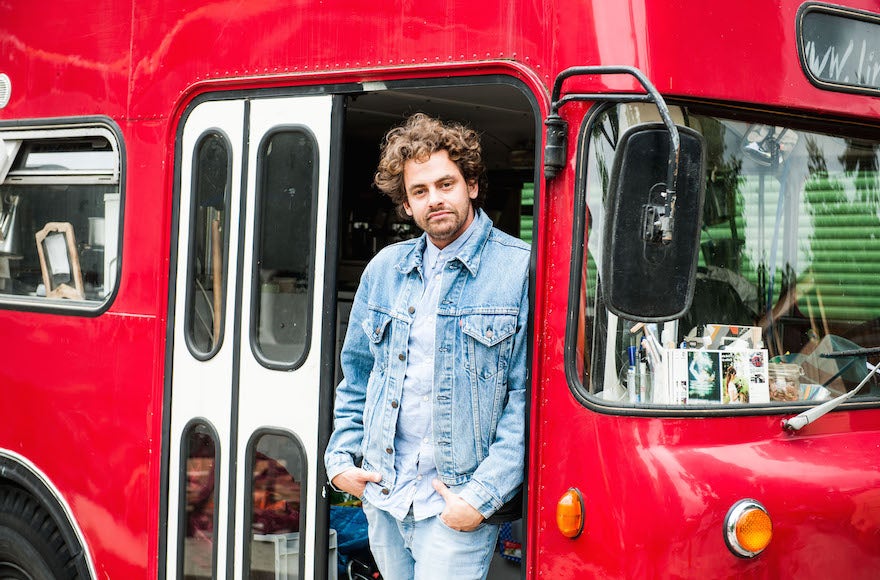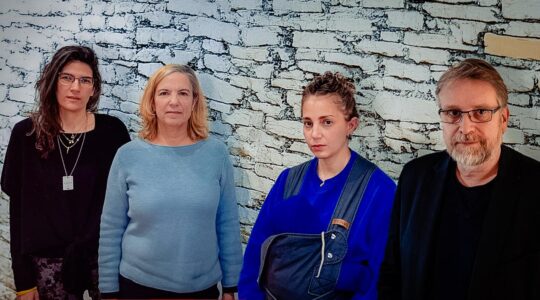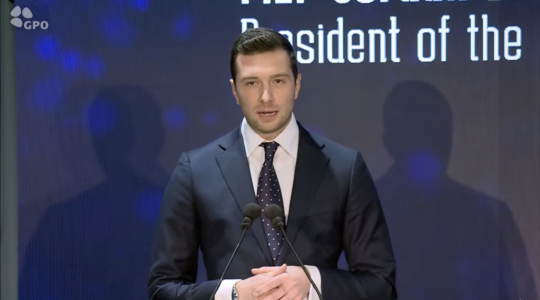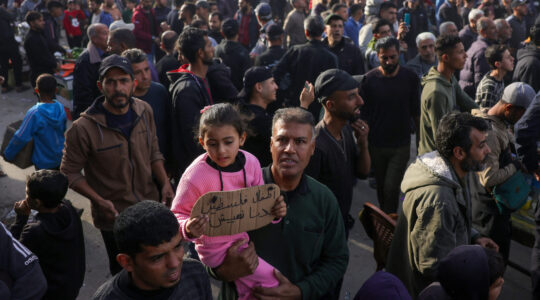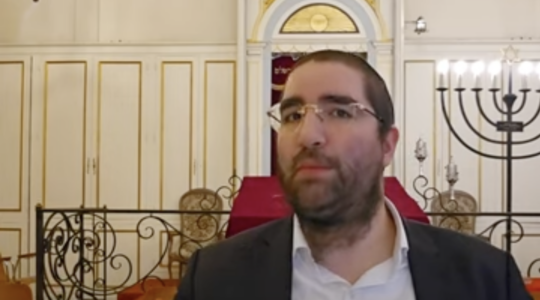(JTA) — As Germany stands on the brink of its national election on Sept. 24, Jews are making themselves heard in ways they have rarely done during its postwar history as a democratic republic.
The nearly 200,000 Jews in Germany are not monolithic in their views. But increasingly they are speaking up as Jews about issues that galvanize the country – particularly the future of Germany and Europe as an increasing number of Muslim refugees arrive.
There’s the new Values Initiative started by a Berlin dentist, Dr. Elio Adler: A group of prominent Jews pushed mainstream political parties to take a stand on various issues, from the Israeli-Palestinian conflict to anti-Semitism and Muslim extremism.
Then there’s the Bus of Contact, a coexistence initiative of Berlin-based Shai Hoffmann, which has been roving the country bringing young Jews, Christians and Muslims into contact with voters before Election Day.
And Bet Debora, a nearly 20-year-old initiative for female cantors, rabbis and Jewish educators in Europe, recently held a panel discussion in the German capital on “The 2017 Bundestag Elections from the Perspective of Jewish Women.”
“You won’t find one voice that speaks for all Jews, and that’s as it should be,” said panelist Petra Somberg-Romanski, a politician in the state of North-Rhine Westphalia and spokeswoman for the board of the working group of Jewish Social Democrats. The center-left Social Democrats are the country’s second largest party.
That said, Jews are especially concerned about the huge influx of refugees from Muslim countries since 2015, “connected with the worry that Muslim-Arab influenced anti-Jewish and anti-Israel sentiments will inflame an already increasing anti-Semitism” in Germany, Somberg-Romanski said in an email to JTA.
“It is here that we are called upon as Jews to take a stand and mix in, loudly,” she said.
And loud they are, says Deidre Berger, head of the American Jewish Committee’s office in Berlin.
Jews in Germany “have started to organize more and create platforms to be able to engage in public dialogue and express their opinions. … It’s part of the growing diversity within the Jewish community,” she said, “and an important signal that community members are becoming far more engaged in the democratic system.”
Germany has been called a bastion of liberal democracy in the age of Trump and Brexit, with Chancellor Angela Merkel — head of the center-right Christian Democratic Union party — a bulwark against a European tide of populism. Pundits say Merkel is likely to win a fourth term.
The very notion of a strong Germany with a major role on the world stage has been unnerving to some. But for Jews in Germany – they make up about 0.2 percent of the overall population – such anxiety is passé.
What they fear today is a Germany that’s too weak, said the Values Initiative’s Adler, a 46-year-old political animal with no party affiliation.
In the 20th century, Jews had a “bad experience with German states that were too strong,” said Adler, referring deadpan not just to Nazism but communist dictatorships in East Germany. “For decades, Jews have always verbalized this concern. Now times have changed. We are raising our voice because we find the state to be too weak.”
German “friendliness” – referring to Merkel’s original openness to Muslim refugees, driven to some extent by a sense of responsibility for the Holocaust – “is taken as weakness” and opens the door to Islamist terrorism, he said. At the same time, Adler said, it could lead to a diminution of democratic, pluralistic values over time.
“Merkel wanted to make a very humanitarian gesture. And the main accusation is not so much that she let them in. She just has not dealt with it correctly,” he said.
Last spring, Adler’s initiative sent a query to all political parties with a chance of getting into the Bundestag, asking them for their stances on various issues. They included a commitment to Germany’s free and democratic “Judeo-Christian” values, a secular public character, a respect for Jews, Judaism and Israel, and a ban on mosques and other Muslim institutions that do not support “democracy and human rights.”
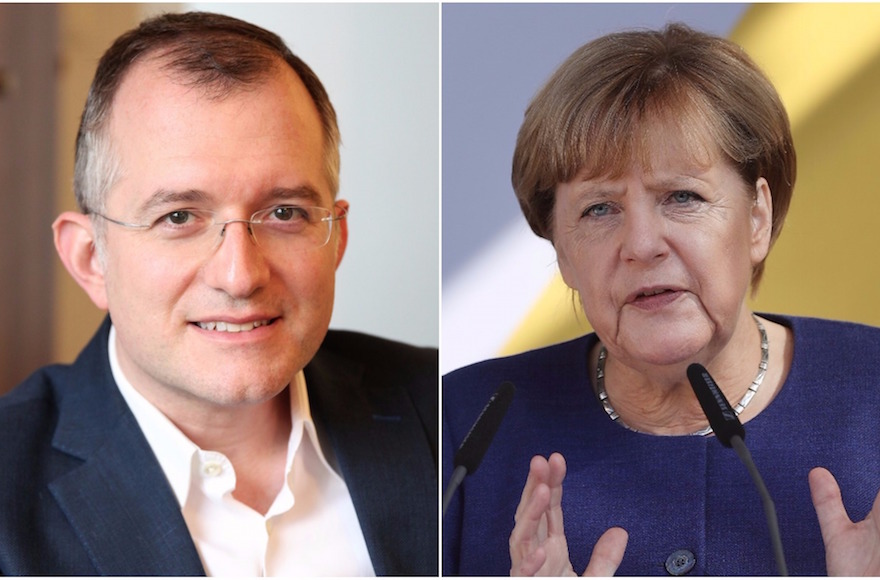
Some German Jews like Elio Adler think Germany’s government, led by Chancellor Angela Merkel, has become too weak. (Adler photo: Courtesy of Adler; Merkel photo: Sean Gallup/Getty Images)
The principles also included a commitment to keeping circumcision and kosher slaughter — for Jews and Muslims — legal and unhindered.
“Our paper is an offer for values-based integration,” Adler said. “If you support these values, you can be a part of society, no matter which passport you have, what the color of your skin is, or what your religion is. We don’t have an agenda of expelling people.”
Adler won’t say which way he’ll vote, but said he was satisfied that the questionnaire got the parties to think about the issues he raised. All stood for religious freedom, and all promised to address Islamist extremism, although they were usually careful not to blame the entire Muslim community for the positions or actions of a few.
The only party that failed to answer was the right-populist, anti-immigrant Alternative for Germany, or AfD, even though some AfD members had signed on to the initiative’s open statement on values last spring.
Adler said AfD members who signed the statement were “whitewashing themselves by supporting us” — that is, sanitizing their extremist image by attaching themselves to a Jewish policy platform.
“But not to let them support us would be anti-democratic,” he added.
For Hoffmann, 35, concern about the AfD was a prime motivator behind the Bus of Contact. The party has representatives in 13 of the 16 German state parliaments.
Though AfD hasn’t had success on the national level, “I was worried,” Hoffmann said. “Basically, you know, I am a grandchild of Holocaust survivors and I don’t want to see a right-wing populist party in the Bundestag.”
So Hoffmann joined with like-minded Muslims and Christians to drive a bus around the country this month with the aim of getting people to talk about issues that matter to them. The bus is outfitted like a coffee shop, and people are invited to come aboard, listen to one another and share their stories.
The project received funding from public and private sources.
The organizers are blogging along the way.
“It’s about encounters, about leaving our filter bubble and going to villages and small cities and looking into their eyes and asking them how they feel, what do they think about,” Hoffmann said in a telephone interview.
Neo-Nazis and other violent extremists “are not our target group,” he said. “We want to talk to people who are really confused about what is happening around the world and in Germany, and to reach out to so-called protest voters who are tired of [the status quo] and … are looking for very easy solutions, populist solutions.
“Our grandparents suffered a lot for the achievement” of a democratic state, he added, “which was gifted to our generation. We have to defend it. If we want to do something for democracy, then this is the time.”
About 85 percent of Germany’s Jewish population — about half of whom are unaffiliated with synagogues — has roots in the former Soviet Union. Most have come to Germany since 1990. They tend to vote more conservatively than the majority of American Jews, although in German terms that is relative: Even Merkel’s Christian Democratic Union is well to the left of America’s Republican Party on most issues.
That said, the Social Democratic Party is the only one to have a specific Jewish caucus, although prominent Jews belong to the Christian Democratic Union, the liberal Free Democratic Party and the leftist Greens.
Is it time for a Jewish Party of Germany?
“There isn’t [one] yet, unfortunately,” the Social Democrat’s Somberg-Romanski said. “But Jews were and are still active in all political parties of Germany, and on many political committees dealing with the most varied themes.
“The diversity of Jewish life in Germany today is pretty remarkable. As different as their decisions may be, it’s important for all the electorate to exercise their right to vote. Only those who vote can have an impact.”
JTA has documented Jewish history in real-time for over a century. Keep our journalism strong by joining us in supporting independent, award-winning reporting.
